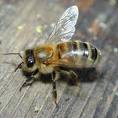THIS IS WHAT CRAZED, AUTHORITARIAN ASS WIPES DO!


“Beekeepers nationwide have experienced honey bee losses of over 40 percent over the 2012/2013 winter period —2013/2014 winter losses are likely to be released soon— with some beekeepers reporting losses of over 70 percent, far exceeding the normal rate of 10 to 15 percent. Some have even been driven out of business. Current estimates of the number of surviving hives in the U.S. show that these colonies may not be able to meet the future pollination demands of agricultural crops.”
Flying in the face of recent science demonstrating that pollinator populations are declining, the U.S. Environmental Protection Agency (EPA) has made the decision to unconditionally register another pesticide that is known to be highly toxic to bees, coming almost one year after EPA registered sulfoxaflor, disregarding concerns from beekeepers and environmental groups. The announcement, posted in the Federal Register on Wednesday, set tolerances for the pesticide cyantraniliprole in foods ranging from almonds and berries, to leafy vegetables, onions, and milk. EPA establishes the allowable limit of the chemical residue, called tolerances, based on what EPA considers ‘acceptable’ risk. EPA’s ruling details that “there is a reasonable certainty that no harm will result from aggregate exposure to the pesticide residue,” despite all evidence that cyantraniliprole is toxic to bees and harmful to mammals.
Ignoring beekeeper warning and concerns on their impacts to bees, EPA has given the green light for cyantraniliprole after recently registering sulfoxaflor. In July 2013, beekeepers filed suitagainst EPA for their decision to register sulfoxaflor when it failed to demonstrate that it will not cause any ‘unreasonable adverse effects on the environment’ as required by the Federal Insecticide, Fungicide, and Rodenticide Act (FIFRA). Several comments were submitted by concerned beekeepers and environmental advocacy groups, like Beyond Pesticides, during the public comment period that stated that approval of a cyantriliprole, pesticide highly toxic to bees would only exacerbate the problems faced by an already tenuous honey bee industry and further decimate bee populations. However, instead of denying or suspending registration in the face of dire pollinator losses, EPA has chosen to register another insecticide that is toxic to bees, dismissing concerns regarding bee health in its response, and setting itself up for further litigation.
No comments:
Post a Comment